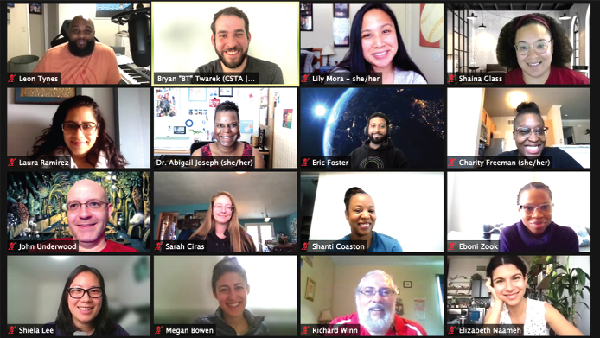
On-line classroom etiquette - Virtual teaching, future of pedagogy
Hybrid courses and classes on-line have become such important daily routines, and they are here to stay.
Considering today’s reality of teaching on-line, the following 12 tips are indispensable:
Advertisement
Leave the keyboard alone
It’s not only distracting everyone else in the meeting (because your laptop’s internal microphone is close to the keyboard), it also prevents you from devoting your full attention to the meeting. Opt for a quality headset or pick up your notebook and pencil or pen to take notes.
Avoid keyboard noises while taking notes. Refrain from searching other media like watching a movie on YouTube while you are on a long Zoom meeting. Keep your writing stationery ready.
Dress appropriately
Dress properly and look presentable. Make sure your hair is well groomed and your clothes are ironed and tasteful. Look the part of a prepared person with an ambition.
Be aware of your surroundings
Your colleagues won’t be able to hear your ideas or take you seriously when there is a pile of dirty clothes in a corner behind you.
Adjust your work setup so that you face a window or are exposed to plenty of light. Make sure your background is professional and work appropriate!
This means: no beds (unmade or made) in the background; no messy rooms or open closets where everyone can see clutter.
Make sure the background is pleasant looking. No younger kids crying, screaming or playing in the background.
No pets barking or disturbing in the background. Better to create a professional work-station for all zoom meets like a TV studio.
Mute your microphone not talking
It’s frustrating to hear echo noise from conflicting microphones. Save everyone from the ear-splitting noises by joining the meeting while on mute!
Unless you live alone, your house is probably quite noisy these days.
Muting your microphone when you’re not speaking gives other participants the ability to join in and share their thoughts without distraction.
Let your colleagues know if you have an audio or camera problem.
Speak up
When you enter a new on-line classroom announce yourself when you join.
Don’t be afraid to project your voice.
Your friends and teachers will appreciate being able to hear you without having to strain their ears or turn their volume all the way up.
No eating or chewing
Please do not eat during your on-line school. No one wants to see you eat or hear chewing sounds while discussing assignments.
Not only is it distracting to others, but you also won’t be able to focus on the task at hand because you’ll be worrying about dropping crumbs all over your keyboard.
It’s better to refrain from chewing anything while engaging in a ZOOM meeting.
Stay seated and stay present
It may be tempting to check your inbox or carry on a side conversation during a dull moment in a meeting, but avoid it! You might miss out on key information or an opportunity to give input.
Use attentive body language: sit up straight, don’t make unnecessary movements. Stay focused.
Remain seated in one place and refrain from leaving the meeting without informing your teachers. Make sure you’re sitting upright and straight.
Pay attention to the discussions and not engage in other errands while you are in the Zoom meeting.
Refrain from checking your smartphone or answering your mobile phone. Where connection is steady, it’s advisable to leave camera on.
Complete your assignments
It’s quite irritating and frustrating to others for you to come in unprepared with assignments.
The teachers and others are spending quality time with you so show them the respect by completing your assignments on time.
Test equipment
Don't wait until the last hurried minutes before your on-line school to sign in. Allow ample time to be prepared.
If you have to use a cell phone, make sure you are situated in an area where there’s a strong signal and minimum interference.
On a computer or a laptop make sure the computer camera works. Make sure the speakers and the microphone work.
It’s best to test that your video and audio work ahead of time, hence the tip to sign on early enough.
Allow even more time in case there is something to download beforehand or in case you have an unexpected update.
Report your absence. If you are not going to be present on on-line class , or if you're going to be late, inform the teachers ahead of time.
Prioritise updates
It is important to make sure that you are prepared for what's going to be discussed, and your own materials are relevant for the occasion.
Be mindful that time is key to your own success on-line or not.
Be prepared
It's bad on-line classroom etiquette to be called on and be unprepared.
It's also a missed opportunity. Have notes in your book next to you, and bookmark anything you need for reference. Clear your desktop of unnecessary things.
Be clear and concise, and if you're uncomfortable with speaking to a group, practise beforehand.
Let your friends know that if they have questions, you'll answer them.
Choose a quiet location
It's easy to forget that a mic picks up not only your voice, but all the sounds around you including chewing something.
If you get up to prepare anything, the sound of your cabinet opening and the ringing of the microwave will be amplified.
Wait until the meeting is over.
Ambient noises can come through on your computer microphone if it's not silenced.
And like most things, location is important: If you live on a busy street, choose a different room to take the meeting.
Sit somewhere with plenty of daylight facing you so you are clearly visible to everyone.
Culled and edited from https://www.indiatoday.in/
The writer is a trainer of teachers, a leadership coach, a motivational speaker and quality education advocate.
E-mail: [email protected]



